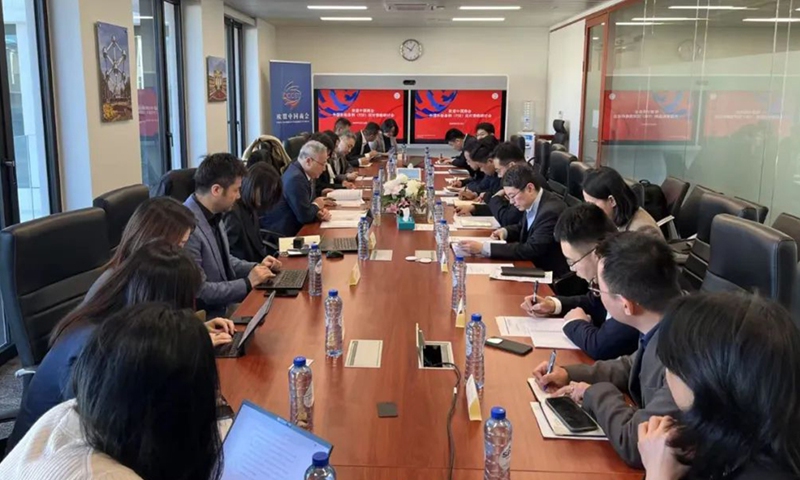
The China Chamber of Commerce to the EU (CCCEU) holds a meeting on March 18, 2025 with businesses specifically aimed at discussing the implications of the bloc's Foreign Subsidies Regulation (FSR). Photo: Screenshot of CCCEU's WeChat post
The China Chamber of Commerce to the EU (CCCEU) held a meeting on Tuesday with businesses specifically aimed at discussing the implications of the bloc's Foreign Subsidies Regulation (FSR) on Chinese companies and assessing potential challenges and countermeasures, according to a news release on the chamber's official WeChat account on Wednesday.
The closed-door symposium gathered executives from key sectors including finance, healthcare, batteries, photovoltaics and renewable energy, and it called on all parties to collectively explore ways to maintain competitiveness within the EU's evolving regulatory environment.
Since the FSR came into effect in July 2023, Chinese firms have faced heightened scrutiny over so-called state-linked subsidies. Chinese authorities,
responding to a request from domestic industries, ruled in early January that the EU's investigative practices targeting Chinese firms under the FSR constituted trade and investment barriers.
Attendees at Tuesday's meeting widely criticized the FSR's core definitions as "overly broad and ambiguous," arguing that the regulation grants the European Commission (EC) "excessive discretionary power." This has resulted in a raft of contentious enforcement measures during its rollout, significantly driving up compliance costs for businesses, they noted.
Some representatives pointed out that the regulation's implementation has hampered their greenfield investment plans in Europe, effectively erecting market barriers that stifle regular business operations and expansion.
"We will continue to monitor the implementation of the FSR, actively support businesses, and promote the healthy development of China-EU economic and trade relations," the CCCEU said.
The FSR authorizes the commission to examine subsidies from non-EU governments to firms engaging in all economic activities across the bloc. As of late November 2024, the EC had launched multiple probes under the FSR, all targeting Chinese companies and their affiliated entities, China's Ministry of Commerce noted in January's ruling notice.
The ministry also highlighted issues such as selective enforcement and a lack of transparency during the EC's probe, warning that such practices could hinder the EU's economic progress, undermine foreign firms' confidence in the European market and threaten the stability of China-EU economic and trade relations.
Yet the timing of the CCCEU's symposium coincides with some signs of cautious optimism over China-EU trade relations amid rising global uncertainty.
This year marks the 50th anniversary of China-EU diplomatic ties. Chinese Foreign Minister Wang Yi told a press conference during this year's two sessions that cooperation between China and Europe "has a greater strategic value and global influence, and a healthy and stable relationship will lift up both sides and make for a brighter world."
Also in early March, the European Parliament lifted restrictions on lawmakers meeting some Chinese officials, which were introduced in April 2023 over alleged human rights issues, the South China Morning Post reported, describing the move as "a fresh indication of a potential thaw in China-EU relations."
As the US threatens a barrage of tariffs and shifts its stance on other EU concerns, Europe is finding itself in a crisis-driven state, compelled to rethink its policy toward China, Cui Hongjian, a professor at the Academy of Regional and Global Governance at Beijing Foreign Studies University, told the Global Times on Wednesday.
"In recent years, the EU has tightened regulations and raised barriers against Chinese firms, but these measures have backfired, leading to weak economic performance and growing skepticism from businesses about their effectiveness," Cui noted.
Moreover, US trade policies are poised to place added pressure on Europe, Cui noted, warning that if the EU continues to cling to outdated assumptions amid this crisis, it risks suffering even greater economic losses.
Meanwhile, during a speech in February, EC President Ursula von der Leyen stressed China's importance as "a vital trading partner" and a partner with which the EU can engage constructively to address common challenges. She called for rebalancing the relationship with China, according to a release on the EC's website.
Cui saw the recent European moves toward China as "a positive shift," reflecting a willingness to break down longstanding barriers and restore cooperation with China.
"After all, collaboration remains the cornerstone of China-EU relations. A turn toward partnership would not only boost confidence in tackling Europe's economic and security challenges but also create new opportunities for mutual benefit," according to Cui.
Over the past five decades, China-EU cooperation has come a long way, with bilateral trade expanding from $2.4 billion to $780 billion and investment rising from almost zero to close to $260 billion, according to the Chinese Foreign Ministry.
Amid US trade pressure, Europe needs to seek common ground with China in opposing unilateral protectionism and promoting an open global economy, noted Cui. He called on the EU to solve trade disputes with China through constructive dialogue, deepen bilateral cooperation in traditional sectors and explore innovative partnerships in emerging fields.




